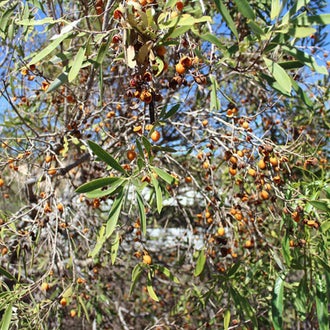Common misconceptions about the treatment of cancer are widespread online and by word of mouth. Sometimes it can be hard to know what is real evidence-based information and what is misinformation. Let’s tackle Tash’s question about gumbi gumbi.
Tash from Brisbane asked:
Is it true that gumbi gumbi can be helpful in treating cancer? Has anyone else heard this, or even tried it?"
Although it is believed that gumbi gumbi may have antioxidant properties, it has never been researched clinically for treating cancer.
Gumbi gumbi (or gumby gumby), otherwise known as the native Australian plant Pittosporum Phylliraeoides, is a medium to large tree that is rare.
There are up to six varieties of gumbi gumbi in Australia. One is used in Aboriginal herbal remedies and the others are toxic.
There are several compounds found in gumbi gumbi. Some, such as tannins and alkaloids, suggest the plant may have medicinal properties, although there is no current scientific evidence to support this.
With all this in mind, a lack of clinical trials on gumbi gumbi and cancer means we can’t yet conclude whether it is in fact helpful, harmful, or ineffective.
Gumbi gumbi (or gumby gumby) is otherwise known as the native Australian plant Pittosporum Phylliraeoides. Gumbi Gumbi is a medium to large tree, native to certain areas of Australia, and very sparsely found. Many people believe there are up to six varieties, with only one having medicinal properties used in Aboriginal herbal remedies and another being toxic.
The major constituent of gumbi gumbi extract is saponin (a sulphonated di- or tri-terpene). Saponins are natural detergents found in plants. They’re highly toxic to cold blooded animals and some have been identified in snake venom, starfish and sea cucumber. Some are toxic to humans. Also present in gumbi gumbi extract are tannins, which have shown potential antiviral, antibacterial, long-term antioxidant and anti-parasitic properties. There are also alkaloids, naturally occurring chemical compounds containing basic nitrogen functionality that have pharmacological effects at low doses and are used in medications and recreational drugs. There is no credible independent scientific evidence that gumbi gumbi extract has any effect on cancer.
iHeard hub
Thank you for joining the mission against misinformation
If you’ve heard a rumour about cancer, or are unsure about information you’ve read online, ask your own cancer question via the iHeard hub.
We want everyone to have the correct information about cancer so if you know anyone else with a cancer question, why not let them know about iHeard?
This article was last updated 09/09/2024.
Author: Saffron Barham, Writer, Cancer Council Australia
Article reviewed by: Associate Professor Carolyn Ee, Principal Fellow, NICM Health Research Institute

